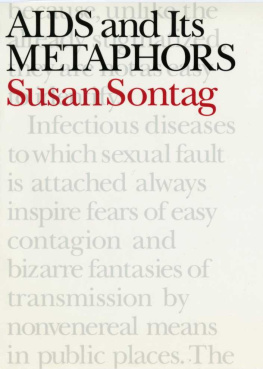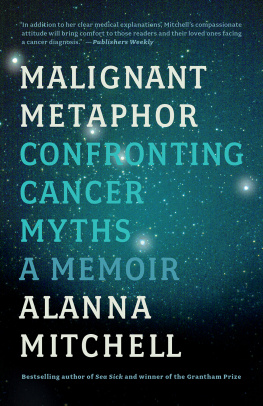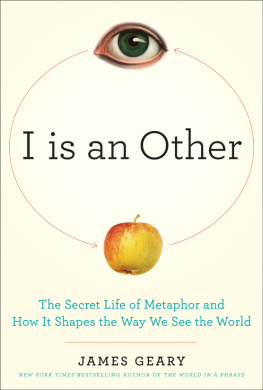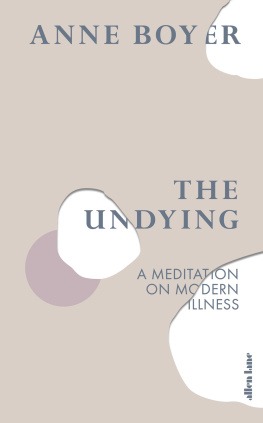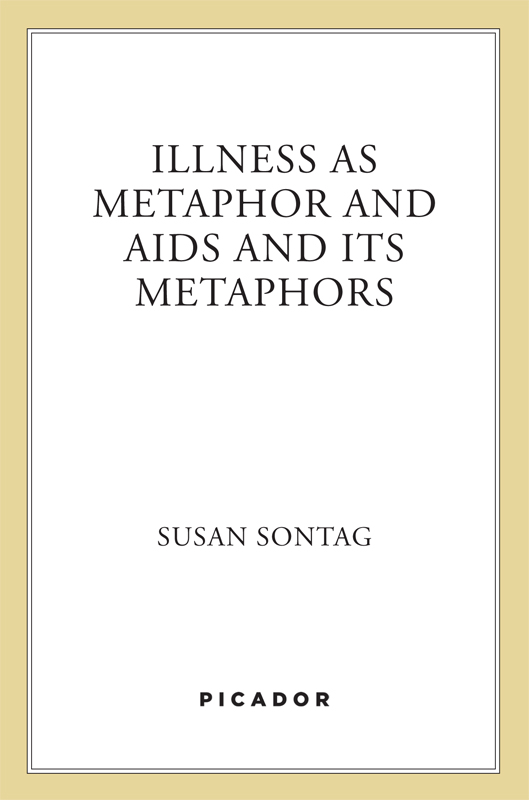
The author and publisher have provided this e-book to you for your personal use only. You may not make this e-book publicly available in any way. Copyright infringement is against the law. If you believe the copy of this e-book you are reading infringes on the authors copyright, please notify the publisher at: us.macmillanusa.com/piracy.
Contents
for Robert Silvers
Illness as Metaphor
Illness is the night-side of life, a more onerous citizenship. Everyone who is born holds dual citizenship, in the kingdom of the well and in the kingdom of the sick. Although we all prefer to use only the good passport, sooner or later each of us is obliged, at least for a spell, to identify ourselves as citizens of that other place.
I want to describe, not what it is really like to emigrate to the kingdom of the ill and live there, but the punitive or sentimental fantasies concocted about that situation: not real geography, but stereotypes of national character. My subject is not physical illness itself but the uses of illness as a figure or metaphor. My point is that illness is not a metaphor, and that the most truthful way of regarding illnessand the healthiest way of being illis one most purified of, most resistant to, metaphoric thinking. Yet it is hardly possible to take up ones residence in the kingdom of the ill unprejudiced by the lurid metaphors with which it has been landscaped. It is toward an elucidation of those metaphors, and a liberation from them, that I dedicate this inquiry.
Two diseases have been spectacularly, and similarly, encumbered by the trappings of metaphor: tuberculosis and cancer.
The fantasies inspired by TB in the last century, by cancer now, are responses to a disease thought to be intractable and capriciousthat is, a disease not understoodin an era in which medicines central premise is that all diseases can be cured. Such a disease is, by definition, mysterious. For as long as its cause was not understood and the ministrations of doctors remained so ineffective, TB was thought to be an insidious, implacable theft of a life. Now it is cancers turn to be the disease that doesnt knock before it enters, cancer that fills the role of an illness experienced as a ruthless, secret invasiona role it will keep until, one day, its etiology becomes as clear and its treatment as effective as those of TB have become.
Although the way in which disease mystifies is set against a backdrop of new expectations, the disease itself (once TB, cancer today) arouses thoroughly old-fashioned kinds of dread. Any disease that is treated as a mystery and acutely enough feared will be felt to be morally, if not literally, contagious. Thus, a surprisingly large number of people with cancer find themselves being shunned by relatives and friends and are the object of practices of decontamination by members of their household, as if cancer, like TB, were an infectious disease. Contact with someone afflicted with a disease regarded as a mysterious malevolency inevitably feels like a trespass; worse, like the violation of a taboo. The very names of such diseases are felt to have a magic power. In Stendhals Armance (1827), the heros mother refuses to say tuberculosis, for fear that pronouncing the word will hasten the course of her sons malady. And Karl Menninger has observed (in The Vital Balance ) that the very word cancer is said to kill some patients who would not have succumbed (so quickly) to the malignancy from which they suffer. This observation is offered in support of anti-intellectual pieties and a facile compassion all too triumphant in contemporary medicine and psychiatry. Patients who consult us because of their suffering and their distress and their disability, he continues, have every right to resent being plastered with a damning index tab. Dr. Menninger recommends that physicians generally abandon names and labels (our function is to help these people, not to further afflict them)which would mean, in effect, increasing secretiveness and medical paternalism. It is not naming as such that is pejorative or damning, but the name cancer. As long as a particular disease is treated as an evil, invincible predator, not just a disease, most people with cancer will indeed be demoralized by learning what disease they have. The solution is hardly to stop telling cancer patients the truth, but to rectify the conception of the disease, to de-mythicize it.
When, not so many decades ago, learning that one had TB was tantamount to hearing a sentence of deathas today, in the popular imagination, cancer equals deathit was common to conceal the identity of their disease from tuberculars and, after they died, from their children. Even with patients informed about their disease, doctors and family were reluctant to talk freely. Verbally I dont learn anything definite, Kafka wrote to a friend in April 1924 from the sanatorium where he died two months later, since in discussing tuberculosis everybody drops into a shy, evasive, glassy-eyed manner of speech. Conventions of concealment with cancer are even more strenuous. In France and Italy it is still the rule for doctors to communicate a cancer diagnosis to the patients family but not to the patient; doctors consider that the truth will be intolerable to all but exceptionally mature and intelligent patients. (A leading French oncologist has told me that fewer than a tenth of his patients know they have cancer.) In Americain part because of the doctors fear of malpractice suitsthere is now much more candor with patients, but the countrys largest cancer hospital mails routine communications and bills to outpatients in envelopes that do not reveal the sender, on the assumption that the illness may be a secret from their families. Since getting cancer can be a scandal that jeopardizes ones love life, ones chance of promotion, even ones job, patients who know what they have tend to be extremely prudish, if not outright secretive, about their disease. And a federal law, the 1966 Freedom of Information Act, cites treatment for cancer in a clause exempting from disclosure matters whose disclosure would be an unwarranted invasion of personal privacy. It is the only disease mentioned.
All this lying to and by cancer patients is a measure of how much harder it has become in advanced industrial societies to come to terms with death. As death is now an offensively meaningless event, so that disease widely considered a synonym for death is experienced as something to hide. The policy of equivocating about the nature of their disease with cancer patients reflects the conviction that dying people are best spared the news that they are dying, and that the good death is the sudden one, best of all if it happens while were unconscious or asleep. Yet the modern denial of death does not explain the extent of the lying and the wish to be lied to; it does not touch the deepest dread. Someone who has had a coronary is at least as likely to die of another one within a few years as someone with cancer is likely to die soon from cancer. But no one thinks of concealing the truth from a cardiac patient: there is nothing shameful about a heart attack. Cancer patients are lied to, not just because the disease is (or is thought to be) a death sentence, but because it is felt to be obscenein the original meaning of that word: ill-omened, abominable, repugnant to the senses. Cardiac disease implies a weakness, trouble, failure that is mechanical; there is no disgrace, nothing of the taboo that once surrounded people afflicted with TB and still surrounds those who have cancer. The metaphors attached to TB and to cancer imply living processes of a particularly resonant and horrid kind.



